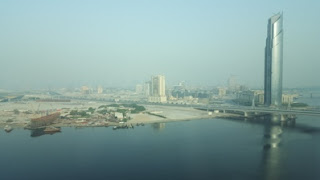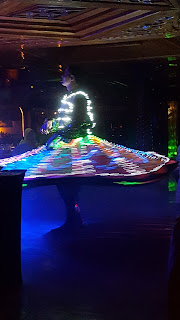Tomorrow is a big day in Mauritius. There's going to be an annular solar eclipse, the likes of which haven't been seen since 1901. It will be visible across southern Africa, Madagascar, Réunion, and Mauritius, and scientific type people, including Merv, have known about it for some time.
Even though appromiately 90% of the sun will be covered, it's obviously very dangerous to look at it. Most people only found out about the event this week when the media started covering it, and there's been a mad rush to try and find the special glasses you need to be able to view the eclipse. There's a Facebook page that completely sold out, re-ordered, and promptly sold the new stock in a couple of hours. There's a scientific centre advertising glasses for sale, but numerous people have gone there, only to find they don't have any left either. Importing stuff takes a while, and since the eclipse is happening tomorrow, there are a lot of disappointed people.
The science centre has some filtered telescopes for people to go along and view the eclipse, and they are setting up some telescopes on the beach at Flic-en-FLac as well. I dread to think how long you might have to wait to actually be able to look through one!
The biggest problem this week though hasn't been the availability of glasses; schools are panicking about what to do with all the children as the eclipse will be happening right around the time they get let out of school. Some schools are using it as a great educational opportunity and are equipped with glasses and a large enough room to keep all the children in, so they can take turns to go and view the show outside. Others are just keeping the children inside all day - the eclipse is between 12h20-15h44 - and watching live on the internet, and others, including my school, are letting the children go home at lunchtime. Sadly, they're not letting the teachers go though, so I won't be able to test any of the alternative viewing methods that have been floating around on the internet for the past few days. :-(
 |
| We should get a pretty good view! |
Even though appromiately 90% of the sun will be covered, it's obviously very dangerous to look at it. Most people only found out about the event this week when the media started covering it, and there's been a mad rush to try and find the special glasses you need to be able to view the eclipse. There's a Facebook page that completely sold out, re-ordered, and promptly sold the new stock in a couple of hours. There's a scientific centre advertising glasses for sale, but numerous people have gone there, only to find they don't have any left either. Importing stuff takes a while, and since the eclipse is happening tomorrow, there are a lot of disappointed people.
| Can anyone get a pair of these to me by tomorrow lunchtime?? |
The science centre has some filtered telescopes for people to go along and view the eclipse, and they are setting up some telescopes on the beach at Flic-en-FLac as well. I dread to think how long you might have to wait to actually be able to look through one!
The biggest problem this week though hasn't been the availability of glasses; schools are panicking about what to do with all the children as the eclipse will be happening right around the time they get let out of school. Some schools are using it as a great educational opportunity and are equipped with glasses and a large enough room to keep all the children in, so they can take turns to go and view the show outside. Others are just keeping the children inside all day - the eclipse is between 12h20-15h44 - and watching live on the internet, and others, including my school, are letting the children go home at lunchtime. Sadly, they're not letting the teachers go though, so I won't be able to test any of the alternative viewing methods that have been floating around on the internet for the past few days. :-(
















































